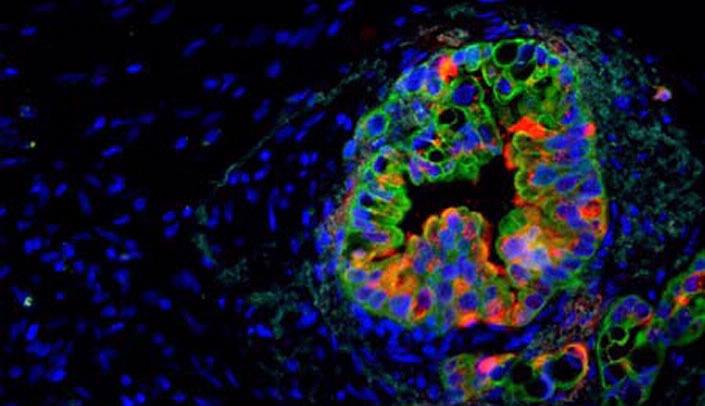As the most common form of pancreatic cancers, pancreatic ductal adenocarcinoma, has a five-year survival rate of just 6 percent. Chemotherapy treatments are poorly effective, in part due to a high degree of drug-resistance.
In a study published online June 6 in the prestigious journal Nature, researchers from the University of California San Diego describe a new model that not only allowed them to track drug resistance in vivo, but also revealed a new therapeutic target, which early testing suggests could provide a strategy to arrest pancreatic cancer growth.
UNMC researchers Tony Hollingsworth, Ph.D., and Paul M. Grandgenett, Ph.D., were co-authors along with principal investigators and co-authors from the University of California San Diego School of Medicine and Moores Cancer Center, Keio University and Ionis Pharmaceuticals.
Dr. Hollingsworth’s team helped validate expression of the target by analyzing samples from UNMC’s pancreatic cancer rapid autopsy program. He said the research supported the concept that stem cells are important in pancreatic cancer progression.
“This publication presents significant findings and we were pleased to play a supporting role. The results suggest a new avenue for trying to target pancreatic cancer, both at the level of tumor cell growth and by targeting chemotherapy resistance,” said Dr. Hollingsworth, Leon Professor of Cancer and professor and director of pancreatic cancer research, UNMC Eppley Institute for Research in Cancer and Allied Diseases.
A new “reporter” mouse model developed by researchers enables non-invasive, image-based tracking of stem cell signals in living animals.
The group showed that the stem cell gene Musashi (Msi) is a critical element in pancreatic cancer progression, revealing that Msi expression rises with cancer progression and that Msi expressing cells are key drivers of cancer growth, drug resistance and lethality.
A next-generation antisense oligonucleotide inhibitor was developed against Msi. The inhibitors effectively targeted and blocked Msi expressing cells, resulting in halted tumor growth in animal models as well as in patient-derived cancer cells, which harbor more complex mutations and are uniformly drug-resistant.
Tannishtha Reya, Ph.D., co-principal investigator, UC San Diego School of Medicine, said the findings could be broadly useful for studying cancer. “Because Msi reporter activity can be visualized by live imaging,” Dr. Reya said, “these models can be used to track cancer stem cells within the tumor microenviroment, providing a real-time view of cancer growth and metastasis, and serving as a platform to test new drugs that may be better able to eradicate resistant cells.”
